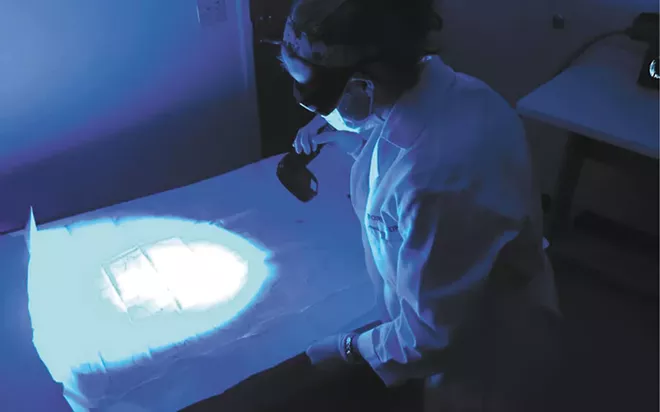
A recent statistical analysis from the Idaho State Police confirms a devastating yet unsurprising picture of sexual assault in the state. Thousands of people are accused of sex crimes. Most get away with it.
The majority of victims who come forward are female (83 percent) and younger than 18 (72 percent). Virtually all of the people accused of sexual crimes are male (94 percent) and know the victim (96 percent), the ISP analysis found.
"Sexual violence is a prevalent concern in Idaho with a significant fiscal impact," writes Danielle Swerin, a senior research analyst for the ISP who authored the report. "Results indicate that reports of sexual violence take almost 10 times longer to investigate, and are nearly half as likely to result in arrest, charges being filed, and a guilty disposition."
These characteristics are not necessarily unique to Idaho, but the analysis using crime and court data from 2009 to 2015 offers numbers that some advocates and researchers say highlight the need for continuing reform. Swerin estimates that rape cases cost Idahoans more than $14 million annually, including expenses for police, the court system and incarceration.
At each point — from the time a sexual assault is initially reported to police, until it's resolved (or not) by the criminal justice system — these cases fall away without a conviction at a higher rate than other violent crimes, the analysis found.
Of the 3,269 reported rapes in Idaho from 2009 to 2015, only 4 percent resulted in a conviction for a sexual crime.
Idaho has drawn national attention in recent years for its outdated laws surrounding sexual assault, for ignored forensic evidence and for the comments like those from Craig Rowland, sheriff of Bingham County on the state's east side, who last year told a reporter that "the majority of our rapes that are called in are actually consensual sex."
The blame does not lie with any one person, one agency or one policy, says Laura King, a Boise State University criminal justice professor who specializes in sexual assault research. Rather, reform is needed throughout the system, she says, from state law to police to prosecutors to judges to society as whole. The question is, how?
"I was not surprised by the findings," King says. "This is generally the trend nationwide."
THE POLICE
It's estimated that about 67 percent of sexual assaults nationwide go unreported to police, according to the Bureau of Justice Statistics. Less than 25 percent of reported sexual crimes in Idaho result in an arrest, compared to 48 percent of nonsexual, violent crimes. In Nez Perce County the disparity is even greater, with only 12 percent of reported sex crimes, but 69 percent of other violent crimes, resulting in an arrest. On average, it takes 86 days from the time of the incident until police make an arrest, Swerin reports.
"The time it takes for an arrest to occur for sex crimes compared to other violent crimes may highlight the unique complexity of sex crime investigations," Swerin writes. "For example, the required timeframe for evidence collection and private nature of the offense result in unique barriers for law enforcement."
King suggests that agencies train officers how to interact with victims of sexual assault. Interviewing techniques should avoid asking victims why they're not crying, or why they waited so long to report the incident, she says.
"Research shows that trauma can cause a person to have flat affect. Someone not familiar with trauma might think they're lying. So having a basic understanding can be very helpful, particularly in sexual assault cases," she says.
Kootenai County Sheriff's Office spokesman Det. Dennis Stinebaugh says several of their detectives have received specialized training in sex crime investigation. But "our office does not discuss the methods and/or techniques used in criminal investigations," he adds.
THE PROSECUTOR
Prosecutors filed charges in only 26 percent of reported sexual assault cases statewide, but in 53 percent of violent, nonsexual cases, the ISP analysts concluded. Of the 8,452 sex crimes reported, only 11 percent resulted in a guilty verdict for a sex crime. Nearly half were dismissed. Others were reduced to nonsexual charges.
"Corroboration is not always present in sex cases, which is one of the reasons they can sometimes be challenging to prove, more so than other cases," Kootenai County Prosecutor Barry McHugh says via email.
Another major obstacle for prosecutors is a "trend ... prohibiting evidence of prior sexual misconduct with other victims," he adds.
This June, the Idaho Court of Appeals threw out guilty verdicts for a Bannock County man convicted of molesting two girls, both under the age of 12. Appeals judges ruled that prosecutors were wrong to combine the two cases into one trial. The fact that the man was accused of similar crimes in two separate incidents could have prejudiced the jury, according to the ruling.
Generally, neither a person's criminal history nor unrelated allegations can be used as evidence of a person's guilt.
In that case, Idaho Court of Appeals Judge Molly Huskey writes that evidence "merely showing a criminal propensity to opportunistically abuse young females entrusted to [the defendant's] care" was not a good enough reason to combine the two cases.
"That makes prosecuting defendants accused of molesting multiple children very difficult," McHugh says. "Legislation could help address this issue."
A delay at the state's forensic lab can also "create problems," McHugh says. It can take up to eight months to process evidence; prosecutors have only six months to bring charges to trial.
Delays in DNA testing, as well as the volume of untested evidence of possible sexual assaults, was the subject of a sweeping Idaho Press-Tribune investigation in 2015 and sparked changes to Idaho law.
THE EVIDENCE
Dating as far back as 1990, an Idaho State Police audit of rape kits that contain possible evidence of sexual assault found that nearly half were not sent to the state forensic lab for analysis.
That revelation brought changes to Idaho's laws, which went into effect last year. The changes require law enforcement to track each rape kit, though police are still not required to send each one for testing (police in Washington state are under such a requirement). For kits that Idaho police do not send for testing, prosecutors are able to review the decision and have the option to overrule.
The state also implemented a first-of-its-kind online database that helps victims and law enforcement track each kit's progress. Another reform, which took effect this year, requires police to store evidence for longer periods of time, depending on the type of case.
King says more changes to Idaho's laws, such as adding nuance to to the statutory definition of rape, could help close the gap between sex crimes and nonsexual violent crimes in Idaho.
But she also sees a larger barrier regarding society's perception of sexual assault, and the shame often attached to it.
"There are so many factors that go into the different stages — arrests made, charges filed — so there are a lot of things to consider," King says. "Educating the public and trying to break down the perceptions of sexual violence is important. It's such a huge issue, it's almost too much to comprehend."♦



















